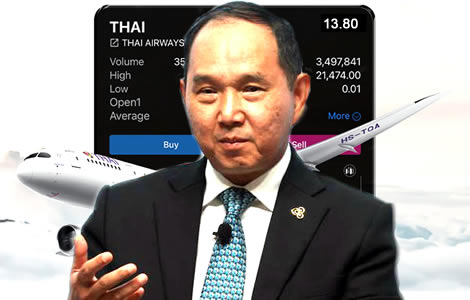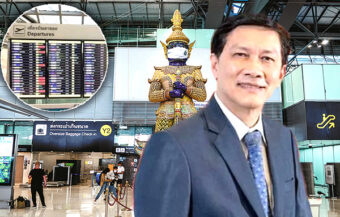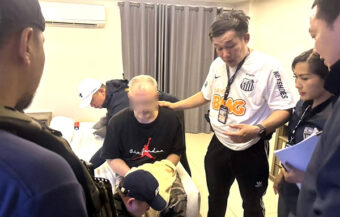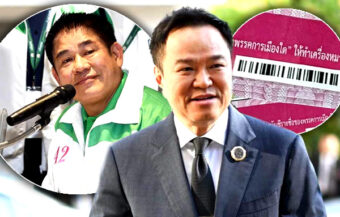Thai Airways soars with a 200% stock surge since returning from bankruptcy, shifting focus to profitable business travellers. With no political pressure on Boeing deals, the leaner, profitable airline aims for steady growth and has regained investor trust for a strong future.
Thai Airways has roared back onto the Stock Exchange of Thailand, with its share price soaring over 300% since Monday. Just four years after bankruptcy, the national carrier is now a market rocket—and a cornerstone in Thailand’s recent U.S. tariff breakthrough. The airline has locked in a deal for 45 Boeing jets, with options for 35 more. But CEO Chai Eamsiri is clear: “There was no political pressure.” He also confirmed a strategic shift. Thai Airways is not just chasing tourists. It’s new focus? High-value business travellers on global routes. Once on life support, the airline is now lean, profitable and aggressive. Thai Airways isn’t just back—it’s ready to soar the skies as an iconic and highly successful airline.

Thai Airways International has staged a dramatic comeback on the Stock Exchange of Thailand (SET), just four years after filing for bankruptcy protection. The airline resumed trading on Monday, August 4, 2025, following a successful court-monitored rehabilitation process. Investor confidence has surged, and the company’s stock is now soaring to unexpected heights.
The initial offering price was set at ฿4.48 per share. However, by Wednesday, Thai Airways shares had skyrocketed to ฿13.80. This marked an almost 200% increase in just 48 hours. On its first trading day, the share price fluctuated between a low of ฿8.55 and a high of ฿11.00, ultimately closing well above expectations.
Financial analysts say airline’s turnaround is real and driven by deep structural and operational reform
This momentum reflects more than just market excitement. According to many financial analysts, it confirms deep structural improvements in Thai Airways’ operations and financial position. In fact, several have stated the company now has a “robust balance sheet” and stable cash flow. That confidence is a far cry from May 2021, when the airline sought protection from the Central Bankruptcy Court in Bangkok.
Back then, Thai Airways was saddled with debt and plagued by mismanagement. The airline’s request for legal protection came amid a collapse in global air travel due to COVID-19. Consequently, the Thai court approved a drastic rehabilitation plan aimed at restoring solvency and reducing operational waste. That plan has now borne fruit.
Chairman Lawaron Sangsanit confirmed on Monday that Thai Airways’ return to the SET marks a major milestone. “We are grateful for the public’s trust,” he said. “This return reflects strong internal reform and solid results.”
Chairman says fleet shortages remain a key barrier to future growth despite strong internal operations
He added that while internal operations are now strong, the airline still faces a shortage of aircraft. “We lack hardware,” he admitted. “If we had more planes, we could generate even higher revenues.”
Importantly, he clarified that Thai Airways’ future aircraft purchases are not politically motivated. Rumours had suggested that recent Boeing orders were linked to U.S.-Thailand trade talks. Some even speculated that former U.S. President Donald Trump, involved in the latest tariff negotiations, pressured Thailand to make large purchases.
However, Mr. Lawaron firmly denied these claims. He stated that the decision to order 45 Boeing aircraft was made in late 2023. This happened months before the tariff talks began. Therefore, the purchase was part of the company’s long-term fleet renewal strategy, not a political deal.
He explained that another 35 aircraft may be ordered in the next phase. Still, those remain options—not confirmed purchases. “There is no obligation to buy,” he said. “We will choose aircraft based on size, type and delivery timing.”
Aircraft deliveries delayed until 2028 as executives deny political influence and affirm independence
In addition, he emphasised that delivery cannot happen this year due to manufacturing delays. Thai Airways expects the new aircraft to arrive no earlier than 2028. Thus, any near-term performance will depend on existing resources.
Furthermore, Mr. Lawaron stressed that Thai Airways has received no official proposal to buy more aircraft. “We operate independently,” he said. “Management decisions are guided by commercial logic—not outside influence.”
CEO Chai Iamsiri supported this stance. He reiterated that since late 2020, the company has made decisions based purely on economic fundamentals. “The Boeing deal was part of our rehab plan,” he said. “There was no political pressure.”
He also confirmed that if Thai Airways records a positive net profit of at least 25%, dividends could be issued to shareholders in 2025. “We are optimistic,” he said. “Our profitability trend supports this possibility.”
Airline resumes Cambodia routes and says tourism decline has little effect on business-focused strategy
Moreover, Mr. Chai provided updates on the airline’s route network. He confirmed that Thai Airways has resumed two daily flights between Thailand and Cambodia. One flight departs in the morning, the other in the evening. He stated that earlier disruptions were resolved, and staff have returned to duty in Cambodia.
While some observers voiced concern over tensions along the Thai-Cambodian border, Mr. Chai dismissed the idea of service cuts. “We are not alone,” he explained. “Other airlines, both local and foreign, continue to operate the same routes.”
Notably, he addressed concerns over reduced tourist numbers from certain regions. For example, Chinese tourist flows have slowed recently. Nonetheless, Mr. Chai insisted the impact on Thai Airways remains minimal.
“Our focus is not on tourism,” he said. “We serve Europe and Australia, and most of our passengers are business travellers.” Therefore, he believes the downturn in Chinese tourism has little effect on operations or revenue.
Advance bookings strong and profitability streak continues despite seasonal dips and industry uncertainty
Advance bookings for the second half of 2025 remain steady. According to Mr. Chai, figures are consistent with bookings seen in 2024. As a result, the airline expects to meet or exceed this year’s targets.
Crucially, he highlighted a key milestone—profitability across ten consecutive quarters. “This includes low seasons like Q2 and Q3,” he said. “Historically, we never made money in those quarters.” But since the turnaround began, Thai Airways has reported profits in every quarter.
This sustained profitability is being seen as evidence of deep structural reform. It also signals a new era for the airline, one where efficiency, transparency, and independence drive growth.
Looking ahead, both executives stressed that Thai Airways will not rush into expansion. Mr. Lawaron said all future fleet decisions will be data-driven. “We must match aircraft to demand,” he said. “That’s how we maintain financial strength.”
Executives say no stock market bubble and airline is now built for profit in all economic conditions
He also reiterated that Thai Airways is not facing artificial pressure on its share price. “Our performance justifies current valuations,” he stated. “And we expect similar strength in Q3 and Q4.”
Mr. Chai agreed. “This isn’t a bubble,” he said. “Our business model now works in both high and low seasons.”
Remarkable turnaround for Thai Airways as it is cleared to return to Stock Exchange of Thailand (SET)
While challenges remain—especially in securing more aircraft—the outlook is positive. Thai Airways now has a leaner cost structure, strong bookings, and a profitable core business. Equally important, the company has regained the trust of investors, regulators and passengers alike.
After years of turbulence, Thailand’s flag carrier is no longer fighting for survival. Instead, it is charting a steady course toward long-term sustainability. As the company moves forward, executives say discipline, not politics, will shape its flight path.
Join the Thai News forum, follow Thai Examiner on Facebook here
Receive all our stories as they come out on Telegram here
Follow Thai Examiner here
Further reading:
Thai Airways union protests government ‘interference’ in its recovery plan at a critical juncture.
People’s Party economic head questions the government’s plans for Thai Airways after new moves
Thai Airways to refloat on Stock Exchange in June 2025 with a renewed mission as national carrier
Passenger complaint turbulence as Thai Airways appears to plot sky-high Dreamliner expansion
Passengers to finally get refunds from high-flying Thai Airways still facing financial turbulence
Flying high at Thai Airways as numbers skyrocket as it flies tourists into the kingdom from Europe


















